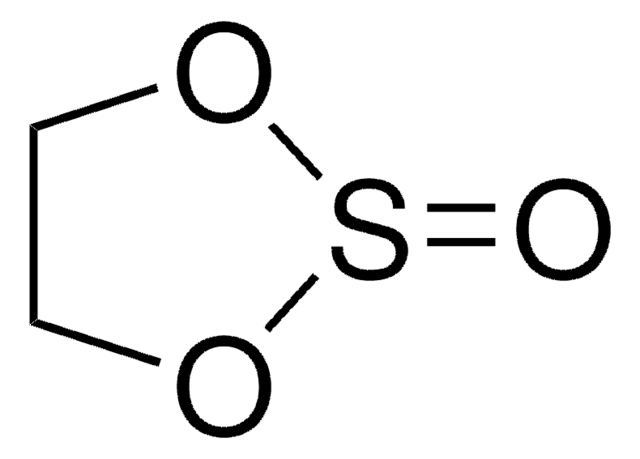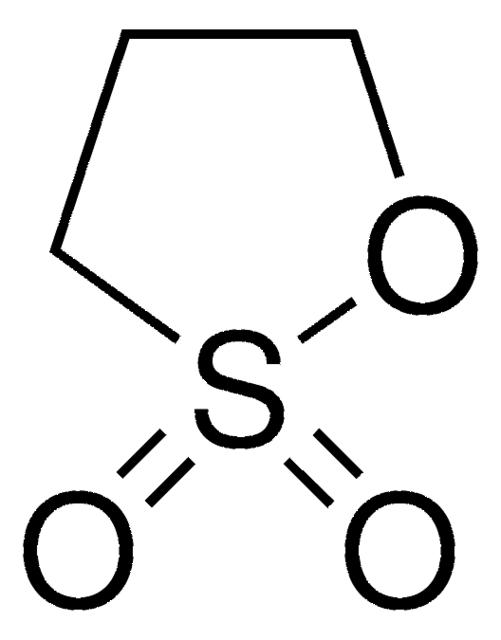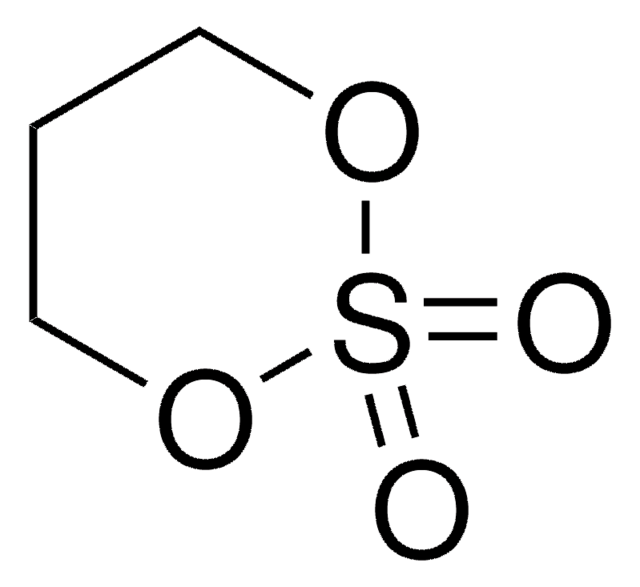774456
1,2-Propyleneglycol sulfite
≥98%
Synonym(s):
1,2-Propanediol cyclic sulfite, 4-Methyl-2-oxo-1,3,2-dioxathiolane, 4-Methyl-[1,3,2]dioxathiolane 2-oxide, PS, Propylene sulfite
About This Item
Recommended Products
Quality Level
Assay
≥98%
form
liquid
greener alternative product characteristics
Design for Energy Efficiency
Learn more about the Principles of Green Chemistry.
sustainability
Greener Alternative Product
refractive index
n20/D 1.437
bp
174-178 °C/760 mmHg
density
1.293 at 25 °C
application(s)
battery manufacturing
greener alternative category
, Enabling
SMILES string
CC1COS(=O)O1
InChI
1S/C3H6O3S/c1-3-2-5-7(4)6-3/h3H,2H2,1H3
InChI key
SJHAYVFVKRXMKG-UHFFFAOYSA-N
Related Categories
General description
Application
related product
Signal Word
Warning
Hazard Statements
Precautionary Statements
Hazard Classifications
Eye Irrit. 2
Storage Class Code
10 - Combustible liquids
WGK
WGK 3
Flash Point(F)
177.1 °F
Flash Point(C)
80.6 °C
Regulatory Listings
Regulatory Listings are mainly provided for chemical products. Only limited information can be provided here for non-chemical products. No entry means none of the components are listed. It is the user’s obligation to ensure the safe and legal use of the product.
FSL
Group 4: Flammable liquids
Type 3 petroleums
Hazardous rank III
Water insoluble liquid
JAN Code
774456-10G:
774456-VAR:
774456-BULK:
Choose from one of the most recent versions:
Certificates of Analysis (COA)
Don't see the Right Version?
If you require a particular version, you can look up a specific certificate by the Lot or Batch number.
Already Own This Product?
Find documentation for the products that you have recently purchased in the Document Library.
Customers Also Viewed
Articles
Experts discuss challenges and production processes of nickel-rich layered oxide cathode materials in energy storage systems.
Li-ion batteries are currently the focus of numerous research efforts with applications designed to reduce carbon-based emissions and improve energy storage capabilities.
Lithium-ion batteries offer high energy density and cyclic performance for portable electronic devices.
The critical technical challenges associated with the commercialization of electric vehicle batteries include cost, performance, abuse tolerance, and lifespan.
Our team of scientists has experience in all areas of research including Life Science, Material Science, Chemical Synthesis, Chromatography, Analytical and many others.
Contact Technical Service








